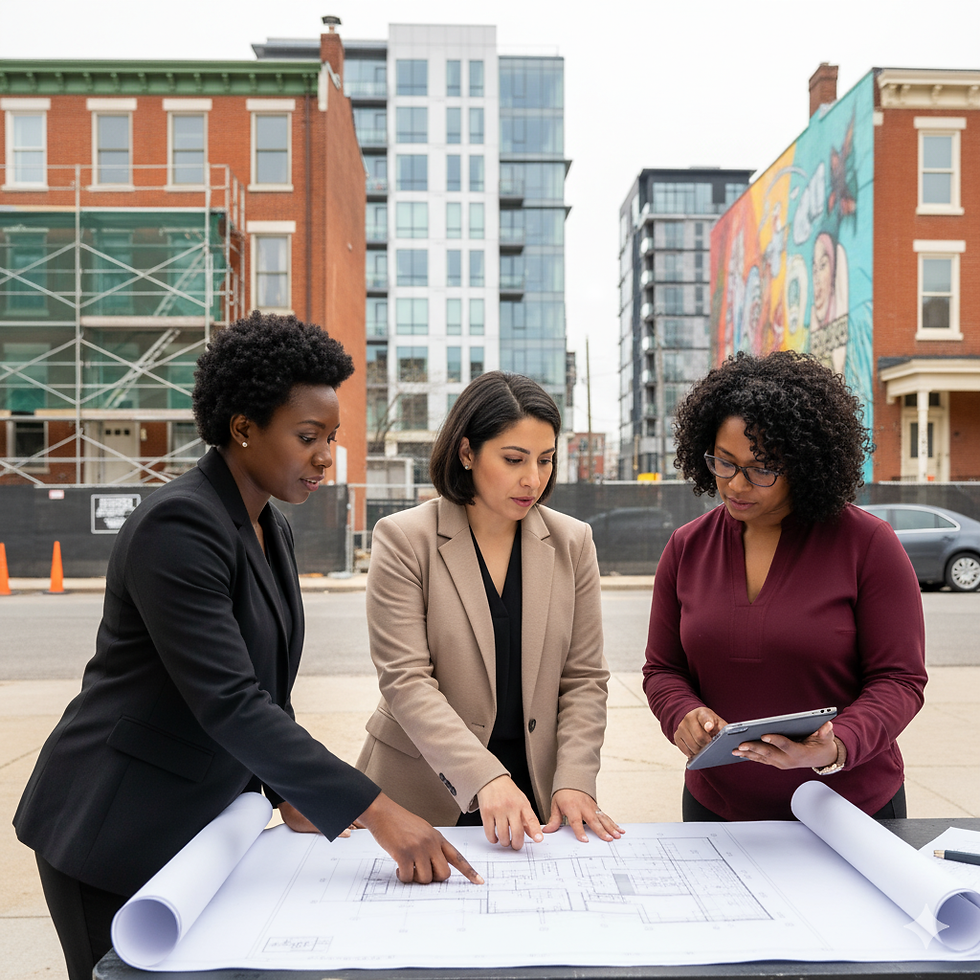Inclusive Housing in Baltimore: Building Neighborhoods Where Everyone Belongs
- WCRED LLC

- Aug 4, 2025
- 3 min read
Baltimore's charm isn’t just in its historic landmarks and waterfront views; it’s in the strength and diversity of its communities. Yet, the reality is that many residents have long faced barriers to affordable, stable housing. The good news? Baltimore is actively shifting toward inclusivity through strategic initiatives aimed at creating housing opportunities where everyone can thrive. At the heart of this transformation are innovative policy changes, substantial funding commitments, and the dynamic growth of Community Land Trusts (CLTs).
New Zoning for New Opportunities
In May 2025, Baltimore took a significant step toward inclusive housing with the introduction of the Housing Options & Opportunity Act (HOOA). This progressive legislation updates zoning laws to encourage the development of low-density multifamily units like duplexes, triplexes, and accessory dwelling units (ADUs) in neighborhoods historically zoned for single-family homes. Complementing this effort, Council Bill 25-0066 passed in June, creating a "Low-Density Multifamily" zoning category to streamline the permitting process for small-scale multifamily projects. These policy tools open doors for developers and investors, reducing bureaucratic hurdles and facilitating quicker, cost-effective construction of inclusive housing in Baltimore.
Major Funding Boosts for Inclusive Initiatives
The last six months have brought unprecedented financial backing for inclusive housing efforts in Baltimore. Most notably, the city's Department of Housing and Community Development issued an $8.1 million Notice of Funding Availability (NOFA) specifically targeted to expand Community Land Trusts Baltimore. Additionally, the state’s $50 million Baltimore Vacants Reinvestment Initiative (BVRI) prioritizes funding for CLTs and community development corporations committed to revitalizing neglected properties into sustainable, affordable housing.
These combined financial resources signal an exciting new chapter for inclusive real estate development, providing a strong financial foundation for projects designed to benefit long-standing residents and communities traditionally underserved by the housing market.
Community Land Trusts Leading the Charge
Community land trusts Baltimore are a key vehicle driving the city’s inclusive housing momentum. CLTs are nonprofit, community-based organizations that acquire land and develop housing, keeping it permanently affordable for future generations through shared-equity models.
The North East Housing Initiative (NEHI) exemplifies the power of CLTs. As of March 2025, NEHI announced new developments increasing its pipeline to 15 permanently affordable homes in neighborhoods like Belair-Edison and Frankford. NEHI’s homes provide families an accessible pathway to ownership, ensuring stability and generational wealth-building.
Similarly, the South Baltimore CLT (SBCLT) launched a forward-thinking initiative combining sustainability and affordability. SBCLT’s spring 2025 project in Curtis Bay and Brooklyn includes zero-waste, net-zero energy townhomes, marrying environmental resilience with housing affordability.
These grassroots initiatives demonstrate the immense potential of CLTs in promoting inclusive, equitable development and setting a precedent for future growth in other neighborhoods, including an anticipated West Baltimore CLT pilot set to begin community planning later this year.
Strategic Advantages for Stakeholders
Baltimore’s inclusive housing framework isn’t just socially responsible—it’s also financially strategic. For developers and investors, new zoning laws and CLT structures offer reduced risk and increased clarity. Banks and community development financial institutions (CDFIs) benefit from layered funding approaches, reducing their exposure while enhancing their community impact.
Nonprofits and community leaders find ample opportunities within these models to actively shape their neighborhoods, ensuring affordability and accessibility are integral parts of Baltimore’s ongoing revitalization. This alignment between community needs and financial viability is key to long-term, sustainable urban development in Baltimore.
Looking Ahead: Sustained Commitment to Inclusivity
The commitment to inclusive housing extends beyond immediate developments. Baltimore’s city administration and local stakeholders are working to institutionalize these changes through forward-looking strategies:
The forthcoming HOOA Affordability Bonus Guidelines, expected by late 2025, will incentivize developers to commit to deeper affordability in exchange for density bonuses.
The Affordable Housing Trust Fund’s (AHTF) upcoming 2026-2030 strategic plan focuses explicitly on increasing permanently affordable units citywide, emphasizing shared-equity and CLT models.


